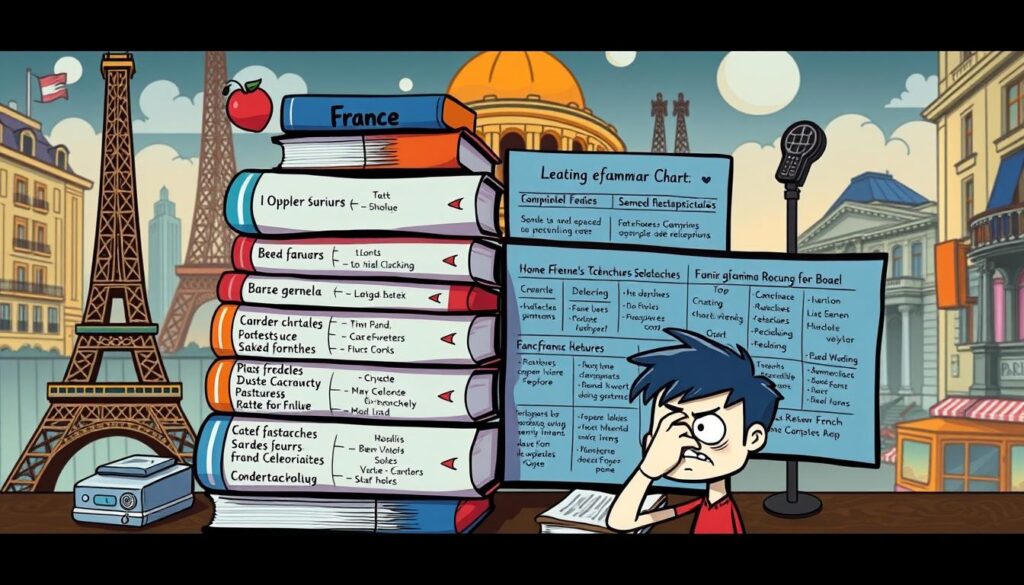Starting to learn a new language is an exciting journey. It’s not just about talking but also understanding different cultures. Choosing between French or Portuguese means diving into unique traditions. Both have Latin roots, making them somewhat familiar to English speakers.
Both French and Portuguese are seen as easy for English speakers by the CEFR. You might get good at them with 600-750 hours of study. If French interests you, imagine connecting with people in 29 countries. It’s a key language in diplomacy and the arts. If you’re drawn to Portuguese, think of experiencing Brazil’s Carnivals or Lisbon’s charm. This language opens doors to 9 exciting countries.
Maybe you’re thinking about taking beginner classes or online courses. You’ll find plenty of resources for both languages. French has a large global community, while Portuguese is known for its musicality and growing importance. With today’s online tools, support for your language journey is always available.
Deciding to learn French or Portuguese means exploring their sounds and words. French has tricky liaisons and sounds like “cent” and “sans.” Portuguese offers unique nasal vowels. These challenges are part of the fun. Remember, language skills develop gradually. Your desire to embrace the culture is key to learning.
Deciphering the Romance Language Roots: French and Portuguese
The Romance language family is vast and influential, touching many lives around the world. If you’re looking into a study abroad language program or a local language immersion program, knowing the connections between French and Portuguese can be very helpful.
History and Evolution in the Linguistic Landscape
French and Portuguese stand out within the Romance languages, each tracing back to Latin. French evolved from Gallo-Romance dialects in modern-day France. It mixes Gaulish and Latin due to years of changes and mingling cultures. Portuguese came from Vulgar Latin on the Iberian Peninsula, with Visigothic and Moorish influences shaping it.
These languages have a big impact globally. French is spoken officially in many African countries and affects others with Arabic. Portuguese is key in African countries like Mozambique and Angola, and has a presence in India and Malaysia through its creoles. Their wide reach highlights their importance and the cultures they represent.
Relating to English: Cognates and Common Vocabulary
French and Portuguese can be easier to learn if you speak English. They have many cognates, words with the same roots. English speakers might recognize French words like ‘liberté’ (liberty) and ‘éducation’ (education). Or Portuguese words like ‘resultado’ (result) and ‘familia’ (family).
But, watch out for false friends—words that look alike but mean different things. For example, the French ‘attendre’ means to wait, not to attend. Knowing these differences helps avoid mistakes and improves learning in a language immersion program.
Mastering Pronunciation: French Oral Elegance vs. Portuguese Melody
Learning to pronounce a language well is crucial. It gives life to words. French and Portuguese stand out with their unique sounds, influenced by their histories and cultures. This leads to a special listening experience. Choosing a language program? This guide on French and Portuguese might help.
French is known for its elegance. It has sounds that you won’t find in other Romance languages. Think of the nasal vowels and the “r” that sounds like it’s from the back of the throat. These make French enchanting yet sophisticated. Also, silent letters in French add a twist that challenges learners.
Portuguese, however, sings with a different tune. Its melody changes whether you’re in Brazil or Portugal. It features nasal vowels too. But, how it sounds in Brazil compared to Portugal is quite distinct. Brazilian Portuguese feels easier for starters, thanks to its open vowels and softer sounds.
This table shows how Portuguese pronunciation differs around the world. In Portugal, you’ll notice a ‘sh’ sound at the end of words. Brazilian Portuguese, however, includes sounds from Indigenous and African languages. Each place makes Portuguese uniquely theirs.
| Region | Characteristic | Influence |
|---|---|---|
| Brazil | Open vowels, softer consonants | Indigenous languages, African rhythms |
| Portugal (North) | ‘Sh’ sound at end of syllables | European roots |
| Portugal (South – Algarve) | Open vowels | Moorish influences |
| Cape Verde | Blend of Portuguese and native language | Creole influences |
Whether you’re drawn to Portuguese’s melodies or French’s articulate charm, both languages enrich your cultural and linguistic knowledge. Joining a language immersion program can enhance your pronunciation quickly. It makes learning these languages more than just adding new words to your vocabulary.
Unlocking Grammar and Syntax: The Path to Fluency
Starting to learn a new language may seem tough, especially with difficult grammar in languages like French and Portuguese. It’s vital to grasp grammar and syntax for fluency. Powerful tools like language learning apps play a key role. They make learning easier for beginner language classes.
Building Blocks of French Grammar
French grammar has a lot of rules about gendered nouns and how adjectives match them. These rules, along with tricky verbs, can be hard for learners. Language apps offer structured lessons. They simplify these rules for both new and experienced learners.
Navigating Portuguese Verb Conjugations
Portuguese is similar to French with gendered nouns but has more regular verb patterns. Even with its irregular verbs, language apps offer clear strategies. These apps provide interactive exercises. Learners can practice and remember Portuguese verb forms better.
Turning grammar into fluent speech or writing in French or Portuguese takes regular practice. With the right tools, this process is easier. It’s about more than rote learning. It’s understanding the flow and structure of these languages.
| Feature | French | Portuguese |
|---|---|---|
| Verb Conjugations | Highly irregular | Moderately regular with notable exceptions |
| Nouns and Adjectives | Gendered, complex agreements | Gendered, simpler agreements |
| Learning Difficulty | High due to exceptions | Medium, more straightforward patterns |
| Grammar Practice Tools | Apps like Duolingo, Busuu | Apps like Duolingo, Memrise |
To master these languages, use app lessons daily. This changes complex rules into natural skills, helping you speak fluently. Every language has its odd parts. Loving these oddities helps with grammar and connects you to their culture.
Key Factors to Consider When Choosing a Language to Learn
Starting a new language journey involves several vital factors. Personal interests, cultural connections, and career goals guide your choice. Whether it’s joining a study abroad language program or a language exchange, the choice is big. From French’s charm to Portuguese’s lyrical tones, pick what matches your life and passions.
Cultural Immersion and the Importance of Relevance
Cultural immersion is key in learning a language. It gives context and life to the language. Imagine interacting with the large French-speaking community or enjoying Portuguese music and literature spanning five continents. With cultural knowledge, a language platform is more than a tool. It’s a door to a vast, rich experience.
Varying Difficulty Levels for English Speakers
It’s smart to consider the learning curve. French and Portuguese are Category I languages for English speakers, making them relatively easy. Yet, each has unique challenges, like Portuguese’s phonetics. Engaging with the 37.6 million Spanish speakers in the U.S. can help learn other languages like Italian and French due to their common roots.
Mastering German offers opportunities with German companies in the U.S. Mandarin Chinese is in demand among multinational corporations. With knowledge and motivation, you can find your unique path in language learning, full of cultural depth and practical use. Explore your options, from study abroad programs to language exchange platforms. Pick a language that offers not just words, but a gateway to new worlds.


